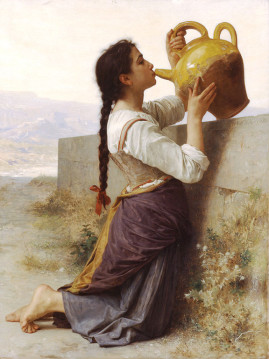 I am currently rereading the book “Siddhartha” by Hermann Hesse. I read it once and loved it. I picked it up this week and fell in love again. So many of us walk around in our skin looking just how we should: pleasing to those around us, a mirror of how we think we should feel inside. And for how many of us is our false self then twice as false?
I am currently rereading the book “Siddhartha” by Hermann Hesse. I read it once and loved it. I picked it up this week and fell in love again. So many of us walk around in our skin looking just how we should: pleasing to those around us, a mirror of how we think we should feel inside. And for how many of us is our false self then twice as false?The Upanishads tell us there is a path of pleasure and a path of joy. One is easy, and one is true. In Herman Hesse’s book, Siddhartha was a source of joy to everyone, except himself. Inside he did not find joy. Inside he was thirsty. Now Siddhartha could have continued this life; he could have ignored his thirst and lived in a way that was false to himself yet brought pleasure to others. No one would have judged him for it. In fact he would, after all, be making everyone’s life easier by continuing to pretend that everything was all right, that his life was fine, happy, satisfying.
I am afraid that this is exactly what most of us do, or at least have done as some point or do to some degree in one or more areas of our life. It is better (easier) we believe, to live up to the social norm of seeming to have it together. Perhaps we even believe that we are living our joy. Perhaps that is only because we bombard ourselves with so much external stimuli that we don’t recognize the thirst within ourselves: the thirst for our joy, the thirst for our truth. For to acknowledge our thirst is to admit that we have been living for pleasure, ease, even a lie. It could even mean losing people in our lives, our image or the path that we worked so hard to put ourselves on. We reason with ourselves that there is enough negative and bad news in the world, so who needs to be burdened with another tale of woe and dissatisfaction? The world does not need that. The world does, however, need your truth, because the world needs your light.
Perhaps instead of complaining that we are thirsty, that life is hard or superficial, we should seek advice from a trusted source and then take action. The world is in need of doers. Siddhartha never burdened those around him with his fears or tiredness. He spoke to his father, demonstrated his determination and went on his quest to quench his thirst, joined by a beloved companion.
Now, I am not suggesting you up and leave, taking only one significant person with you! What I do recommend is that you create enough space for yourself that you can tune into your innermost being. You can do this by lessening your sensory input. Stop feeding your external senses to numb out your internal ones. Instead, nourish them through intentional silence, meditation, a physical practice that encourages you to be inside, such as walking or yoga, even attending a quieter worship service that provides time for introspection. A caution here: at first no one will thank you for taking time for yourself. It will seem selfish. It could stir up things in others that they may resent you for. Moderation is always important, especially if you have responsibilities such as family. Cause and effect are very real, and the choices you have made still need to be honored. However, you also have a responsibility to the life you were given. Carve out time and space to discover the you that has been hushed up.
Is there a truth buried deep within you that is slowly dying from thirst? Do you want to travel to the grave without giving every ounce of your being the chance to breathe, to live, to be quenched? Wouldn’t it be interesting to bring water to a place and then wait to see what other area in your life expresses thirst?
Turn off the TV, your phone, your responsibilities, your senses every day. Start small: just five minutes. Work your way towards 20, 30, even 60 minutes. Explore your reaction to stillness until you become aware of just how un-still stillness is.
Leave mundane acceptance behind. Become a seeker of your truth, of your light. Marianne Williamson once said, “… as we let our own light shine, we unconsciously give other people permission to do the same. As we are liberated from our own fear, our presence automatically liberates others.” I give you permission. Now take some quiet action, and give
permission to someone else.





